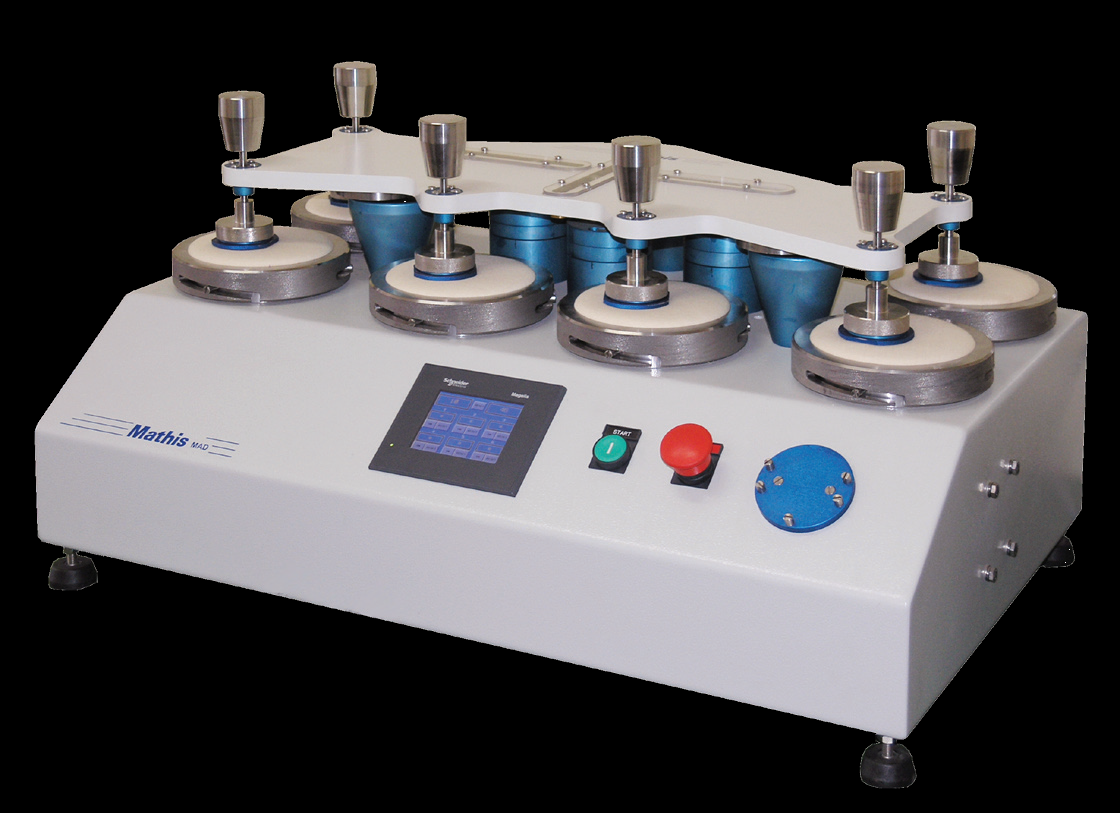NF EN ISO 12947-2 Abrasion resistance Martindale method
The NF EN ISO 12947-2 standard specifies a procedure for determining the abrasion resistance of textile fabrics using the Martindale method. This internationally recognized test is essential in ensuring that textiles meet the required durability standards, which are critical for various sectors including automotive, medical, and home furnishing industries.
The Martindale abrasion testing machine is used to simulate real-world wear conditions by subjecting fabric specimens to repeated frictional action with a synthetic yarn. The test aims to evaluate how well the fabric resists pilling and wear over time. This method provides a standardized way of assessing the durability of textile materials, which is crucial for manufacturers aiming to meet quality standards.
The testing process involves placing a specified weight on top of a rotating drum containing the synthetic yarn. The drum then rotates at a set speed, causing the fabric to be rubbed against the yarn. After reaching the stipulated number of cycles (typically 5000 or more), the fabric is inspected for signs of wear and pilling. The test results are reported in terms of the number of cycles before visible signs of wear appear.
The NF EN ISO 12947-2 standard ensures that all tests conducted follow a consistent protocol, which helps in comparing results across different laboratories worldwide. This is particularly important for global manufacturers who need to ensure their products meet international standards and can be trusted by consumers around the globe.
For weavers and textile producers, this test is vital as it helps them understand how well their fabrics will perform under real-world conditions. By using this method, they can identify potential weaknesses in their materials early on and make necessary improvements to enhance the quality of their products. This not only enhances customer satisfaction but also improves brand reputation.
The Martindale abrasion test is widely used across various industries that rely heavily on textile durability. For instance, automotive manufacturers use this method to ensure seat covers and other interior components last longer without significant wear. Similarly, medical device companies might apply it to ensure the longevity of surgical gowns and other protective gear.
Understanding the importance of this test is crucial for quality managers and compliance officers who need to ensure that their products meet regulatory requirements. R&D engineers can also benefit from knowing how different fabric properties affect abrasion resistance, which helps them innovate and develop new materials with improved performance.
In summary, NF EN ISO 12947-2 provides a robust framework for evaluating textile durability through the Martindale method. This ensures that textiles used in critical applications are reliable and long-lasting, enhancing overall product quality and consumer trust.
Why It Matters
The abrasion resistance of textiles is not just about aesthetics; it plays a crucial role in determining the longevity and functionality of textile products. Textiles that lack adequate abrasion resistance may show signs of wear and pilling even after minimal use, leading to premature replacement and increased costs for consumers.
- Enhanced Durability: Products with high abrasion resistance last longer, reducing the frequency of replacements and repairs.
- Improved Quality Perception: Consumers are increasingly aware of product longevity. Textiles that resist wear better give a positive perception of quality.
- Economic Benefits: Reduced maintenance costs and extended product life cycles contribute to overall economic efficiency.
- Environmental Impact: Longer-lasting products mean less waste, contributing positively to environmental sustainability efforts.
The NF EN ISO 12947-2 method ensures that textiles are tested under controlled conditions, making it possible to compare results across different samples and batches. This consistency is vital for manufacturers who need to ensure their products meet quality standards consistently.
By investing in robust abrasion testing procedures like the Martindale method, companies can significantly enhance the reliability of their textile products, thereby improving customer satisfaction and brand loyalty. Additionally, compliance with international standards such as NF EN ISO 12947-2 helps businesses avoid potential legal issues and ensures they remain competitive in a global market.
Eurolab Advantages
EuroLab offers comprehensive abrasion resistance testing services using the Martindale method, adhering strictly to NF EN ISO 12947-2 standards. Our state-of-the-art facilities and experienced team of technicians ensure accurate and reliable results every time.
- Expertise: Our technical staff is well-versed in the latest testing techniques and can provide detailed analysis tailored to your specific needs.
- Accurate Results: Using precision instruments, we ensure that each test meets international standards for accuracy and reliability.
- Comprehensive Reporting: Our reports are detailed and include all relevant data points necessary for understanding the full scope of your fabric's performance.
- Fast Turnaround Times: We understand the importance of timely results, which is why we strive to deliver accurate reports within industry-standard timelines.
EuroLab’s commitment to quality and innovation sets us apart as a leading provider of textile testing services. By leveraging our expertise and state-of-the-art facilities, you can rest assured that your products will undergo thorough and reliable testing before reaching the market.
With EuroLab, you gain access to cutting-edge technology and experienced professionals who understand the nuances of textile testing. Our services are designed to meet the highest standards, ensuring that your products not only pass tests but also perform exceptionally well in real-world conditions.





